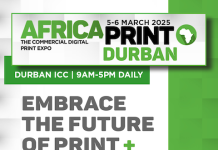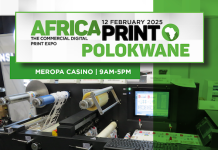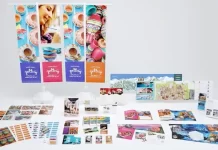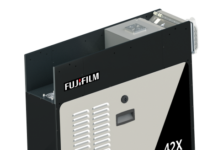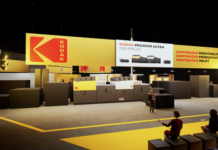HP Indigo and its South African partner, Kemtek Print Solutions, teamed up in April to host two special customer presentations in Johannesburg and Cape Town. Guests, including media representatives, were given a full update on worldwide digital printing trends and HP Indigo’s latest printing technologies.
‘Hosting intimate, customer-facing events like these allows us to spend one-on-one time with one another and develop a more personal relationship,’ said Alon Bar-Shany, VP and general manager for HP Indigo digital press division, who opened proceedings at both events. ‘South Africa, like any other country, has a unique business culture that presents a variety of growth opportunities coupled with various operational challenges. If we are to grow with our South African customers then we need to understand their needs and the only way to do this is to communicate effectively and build strong long-term relationships. This is why events of this kind work so well for all concerned.’
Bar-Shany indicated why he’s excited about the future of digital printing in South Africa: ‘There’s been many changes in the commercial printing sector over the last five years and in Europe, where traditional offset printing is in decline, businesses are adapting to change, realising that a fundamental shift in behaviour is required to stay ahead of the pack,’ he said.
‘During the last two years, some South African printers have been a little more reserved, choosing to remain cautious with regards to new equipment investments. There may be various reasons for this, like the exchange rate or confusion regarding ROI. The latter is a critical factor that needs to be considered when making a purchase for growth. To realise the benefits that can be enjoyed by investing in the latest digital printing solutions, I’d like to encourage more interaction between local South African printing customers and their international counterparts who have already made positive changes to their businesses.’
Bar-Shany referred specifically to a tried and tested communications platform called Dscoop, an independent digital solutions cooperative of graphic arts business owners and professionals who use HP Indigo equipment.
Already launched in North America, Asia, Europe and the Middle East, it’s a community focused on educating and connecting its members with technology and systems specialists, via webinars and chat forums, to improve business growth, efficiency and profitability. ‘Sharing ideas and business processes is fundamental. We operate in a global marketplace where printers are placed under greater pressure to react faster and produce short runs. Change is happening quicker and there’s ample opportunity for entrepreneurs to build new business and indeed new markets if they have the right tools to do so,’ said Bar-Shany.
Meeting specific market needs
Global printing trends are determined by consumers, said Bar-Shany, and HP Indigo has worked non-stop to develop ultra-modern digital printing platforms that address constantly-evolving consumer needs.
Newly-released systems mentioned at the recent local presentations included the HP Indigo 7600 and the robust 10000, the first offset-quality digital press suitable for printing commercial jobs, publishing and photo prints up to B2 format.
Launched at drupa 2012, the ground-breaking 10000 press has already been adopted by several international commercial printers who are producing pocket folders, six pagers, large advertisements, POS/POP, brochures, leaflets, business cards, direct mail postcards, photo books and more.
‘The sky’s the limit with the 10000, from oversized book covers and art books, cards, tags and menus, to folding carton packaging applications, it offers outstanding, versatile features that allow print to come to life,’ said Bar-Shany.
HP has developed its new line of presses to serve very distinct market sectors and one area where Alon sees much potential for digital printing is in packaging. ‘There are three traditional printing methods used to produce printed packaging – flexo, litho and gravure – each with their own disciplines and printing procedures,’ he said.
‘Two factors unite these methods – time and cost. Job preparation, including ink mixing, correct print registration and tension control, takes time to perfect and, while these methods provide benefits for long campaigns, they’re rarely cost-effective for short run jobs. As a result, we’ve recently launched two packaging-specific platforms, the 20000, a web-fed press aimed at the flexible packaging market, and the 30000 sheetfed press, for folding carton converters. In both of these packaging sectors converters have to deal with modern supply chain pressures, growing SKU diversity, and frequent redesigns. Both HP Indigo systems allow printers to produce short run jobs at any time with no make-ready and minimum waste. Variable data printing including text, graphics, barcodes, and security elements can also be applied if required. Our unique ElectroInk technology delivers quality indistinguishable from gravure and offset respectively, using HP IndiChrome Pantone-certified on-press up to seven-colour emulations, opaque white ink, and off-press mixed spot inks,’ he added.
Both presses are easily integrated into existing production processes. ‘I foresee, at least for the next few years, digital production co-existing with offset printing. Packaging will become a very big part of our business in the future and it’s important that we offer our customers value applications that give them the best print quality and returns. Discerning consumers are demanding more sophisticated brands and it’s a great time for South African converters to invest in our digital technology,’ he said.
Local support and world-class equipment
The utilisation of existing HP Indigo machines in South Africa is very good, said Bar-Shany, and several converters have established lucrative projects based on the versatility and quality of their machines. ‘South African printers are either investing to add capacity or replacing old analogue systems. In the commercial sector many are upgrading their Series 2 presses to the latest platforms and, with the introduction of our Series 4 machines they can increase printing capacity and use new features, which in turn allows them to pursue new market opportunities. We’re giving printers the opportunity to leap frog from older print systems up to the most modern machines, which can handle different substrates and provide various special effects. In the wine label market for instance, opportunities abound to increase on-shelf appeal, simply by using these original HP Indigo tools.’
With Kemtek driving HP Indigo sales and service, Bar-Shany aims to build on existing local customer relationships and embark on fresh projects with other commercial printing, label and packaging specialists.
‘Kemtek has created a strong following for HP Indigo, backed up by its service commitment and technical know-how. Investment in the right partnerships provides for productive local discussions and business models and, along with Kemtek, we aim to improve our propositions by collaborating more closely with customers on special projects and liaising with brand owners if required. World class training will continue to be our priority and, once again we’ll be hosting our highly-successful HP Capture training seminars in Johannesburg and Cape Town during 2013, where customers will get practical advice on tried-and-tested marketing techniques to allow them to obtain the best ROI on their HP Indigo equipment, said Bar-Shany.



